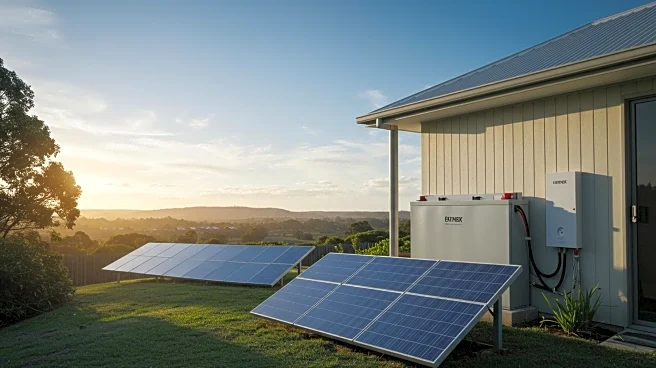What's Happening?
Australia is witnessing a significant increase in the adoption of home battery systems, driven by government subsidies and the need for energy independence amid the ongoing climate crisis. The Australian federal government has introduced the Cheaper Home Batteries subsidy, offering a 30% discount on small-scale battery systems for households, businesses, and community organizations. This initiative has led to a surge in applications, with 11,500 submissions in the first three weeks. The uptake of home batteries is expected to reduce electricity bills by allowing users to store solar power for use during peak hours, potentially selling excess energy back to the grid. The initiative is part of a broader effort to reduce reliance on coal and gas power, with predictions of 10,000MW of battery capacity being installed within five years.
Why It's Important?
The rapid adoption of home battery systems in Australia highlights a shift towards decentralized energy solutions, which could have significant implications for energy markets globally, including the U.S. By reducing reliance on traditional power sources, such as coal and gas, and increasing the use of renewable energy, countries can lower emissions and enhance energy security. This trend also underscores the potential for similar initiatives in the U.S., where energy independence and sustainability are growing concerns. The success of Australia's subsidy program could serve as a model for U.S. policymakers aiming to encourage renewable energy adoption and reduce carbon footprints.
What's Next?
As the adoption of home batteries continues to rise, the Australian government is expected to review and potentially increase its emission reduction targets. The success of the Cheaper Home Batteries scheme may lead to further incentives for renewable energy solutions, including electric vehicles. In the U.S., similar programs could be considered to accelerate the transition to renewable energy and address climate change. Stakeholders, including energy companies and environmental groups, will likely monitor Australia's progress closely to assess the feasibility and impact of such initiatives in other regions.
Beyond the Headlines
The widespread adoption of home batteries in Australia could lead to a cultural shift in how energy is consumed and managed. By empowering individuals and communities to generate and store their own energy, there is potential for increased resilience against natural disasters and energy shortages. This movement also raises questions about the future of centralized power systems and the role of traditional energy providers in a rapidly changing landscape.









